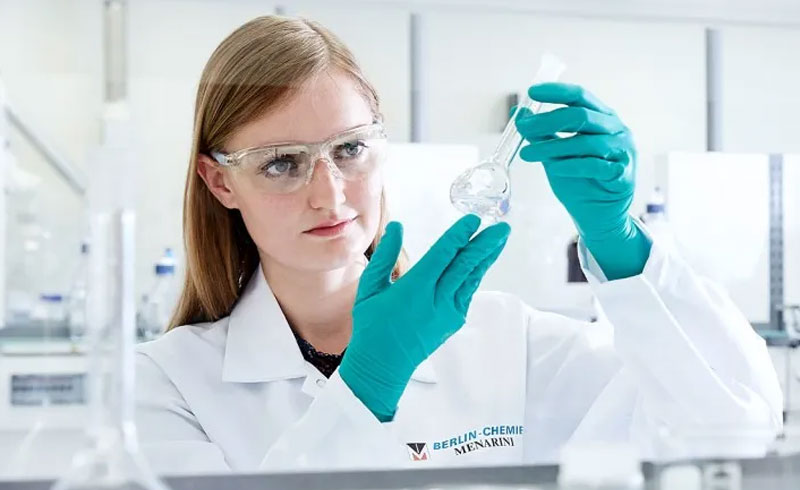Welcome to the News & More section. Here you will find general information in the form of press releases, news and the latest graphical material.
- About Us
- Therapeutic Areas
- Responsibility
- Partnering
- Professionals
- News & More
- Careers
- Share on
- X
- SCROLL TO TOP
Berlin-Chemie has been developing, manufacturing and distributing pharmaceutical products for over 130 years and has been a wholly owned subsidiary of the Menarini Group, the leading Italian pharmaceutical company, since 1992.
For patients, we provide the latest patient information leaflets and training materials as well as the technical information for Berlin-Chemie products available in Germany via our Medical Hub.
Responsibility is a top priority at Berlin-Chemie. We not only make an important contribution to healthcare, but also put our values into practice through various social initiatives.
Discover More about Global Responsibility

From school kits to free meals and medicines, to caring for the environment around the world. In Menarini, being responsible means translating our values into concrete actions that are good for others and good for the planet
Berlin-Chemie – a strong partner. Our many years of experience and the success of joint projects make us the partner of choice.
Discover More about Global Partnering

Menarini has in-depth know-how in many important therapeutic areas, thanks to many years of excellent market introduction, marketing and sales capabilities as well as expertise in regulatory aspects and market access. Collaboration is the key to great success, and at Menarini, partnership is part of the DNA.
Our holistic and professional health management offers doctors individual counselling, training or workshops, events and lectures on many topics, depending on their needs.
Our Medical Hub acts as a central point of contact for doctors and healthcare professionals. Here you will find all the information about our medications, additional service and training opportunities.

We employ professionals with a wide variety of career backgrounds and are employers who care about their staff. Together, we stand for innovation and reliability.

Our Job Portal
Find out about our current vacancies at Berlin-Chemie directly on our career portal.
Within the Menarini Group, Berlin-Chemie is the regional headquarters for the CEE and CIS region and is responsible for more than 30 countries and their local subsidiaries.
As a reliable partner in the healthcare sector, we want to use our products and expertise to help solve the complex challenges in the healthcare sector in these regions. To this end, Berlin-Chemie has established strong partnerships at all levels in many countries. We support doctors and patients with high-quality medical products and technologies to improve the quality of life.
Our regional headquarters
BERLIN-CHEMIE AG
Glienicker Weg 125
12489 Berlin, Deutschland
E-mail: info@berlin-chemie.de
Phone: +49 (0)30 6707-0
Fax: +49 (0)30 6707-2120
I WANT INFORMATION ABOUT
I WANT TO REPORT A PROBLEM
Fever and Pain
The term fever is used to refer to high core body temperature which may occur when the body is defending itself against pathogens such as viruses, bacteria or moulds.
Body temperature may fluctuate a little throughout the day but is normally between 36.0 and 37.4 degrees Celsius. Fever is also subdivided as follows:
- A temperature from 37.5 to 38 degrees Celsius is referred to as an elevated body temperature.
- A temperature of 38 degrees Celsius or more is referred to by the medical term “fever”.
- Initially, however, temperatures up to 38.5 degrees Celsius are referred to as mild fever.
- Initially, however, temperatures up to 38.5 degrees Celsius are referred to as mild fever.
- Temperatures above 40 degrees Celsius are considered to be a very high fever.
- In rare cases the core body temperature may increase above 41 degrees Celsius, in which case it is referred to as an extreme fever.
There are normally three stages of a fever: the ascent phase, the peak and the decrease. In the ascent phase attempts are made to increase body temperature by goosebumps or trembling, which can cause shivering. In extreme cases fever-induced delirium may occur at the peak, when the fever is fully developed, with dimming of consciousness (obtundation) and perception. These clear as the body temperature falls and do not normally cause lasting damage. During the decrease phase when the temperature is falling, severe sweating may occur.
Those affected may experience severe headaches and aching limbs as well as pronounced discomfort during the fever. Drugs such as antipyretics (fever-reducing drugs) are available to reduce fever or mitigate these concomitant symptoms.












